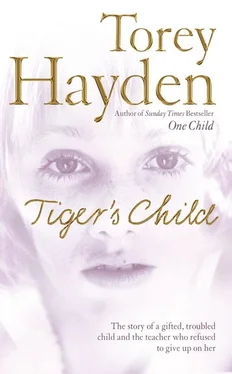She liked to read and she could, I think, read virtually anything I placed in her hands. What stopped her was not her ability to turn the letters on the page into words, but rather to turn them into something meaningful. Sheila’s life was so deprived that much of what she read simply made no sense to her. As a consequence, I began reading with her.
There was something compelling about sharing a book with Sheila. We would snuggle up together in the reading corner as I prepared to read aloud to her and Sheila would be so ravenous for the experiences the book held that her entire body’d grow taut with excitement. Winnie the Pooh, Long John Silver and Peter Pan proved sturdier magic than Chattel of Love. However, of all the books, it was Saint-Exupéry’s The Little Prince that won Sheila’s heart. She adored this bemused, perplexing little character. His otherness she understood perfectly. Mature one moment, immature the next, profound, then petty, and always, always the outsider, the little prince spoke deeply to Sheila. We read the book so many times that she could quote long passages by heart.
When not reading, we simply talked. Sheila would lean on the table and watch me work, or we would pause at some point in a book for me to explain a concept and the conversation would go from there, never quite returning to the story at hand.
Progressively, I learned more about Sheila’s life in the migrant camp, about her father and his lady friends who often came back to the house with him late at night. Sheila told me how she hid his bottles of beer behind the sofa to keep him from drinking too much, and how she got up to put out his cigarettes after he had fallen asleep. I came to hear more about her mother, her brother and the abandonment. And I heard about Sheila’s other school and her other teachers, about what she did to fill her days and her nights, when she wasn’t with us. In return, I gave her my world and the hope that it could be hers as well.
Those two hours were a godsend. All her short life Sheila had been ignored, neglected and often openly rejected. She had little experience with mature, loving adults and stable environments, and now, discovering their existence, she was greedy for them. The busy atmosphere of the classroom during the day, supportive as it was, did not allow for the amount of undivided attention Sheila required to make up for all she had lacked. It was in the gentle silence of the afternoon when we were alone, that she dared to leave behind her old behaviors and try some of mine.
The real issue for Sheila was what had happened between her and her mother on that dark highway two years earlier. Given her extraordinary giftedness, the matter did not remain inarticulate. With exquisite clarity, she gave a voice to her agony.
The relationship between the abandonment and Sheila’s difficult behavior became most obvious over schoolwork. Despite her brilliance, Sheila simply refused to do any written papers. I hadn’t made the connection initially. I saw the aggressive misbehavior as waywardness and only afterward realized it was a ploy to keep her from having to sit down at the table and take a pencil in hand. Coercing her to the table proved a major battle and even then she held out, refusing to work. When she did eventually start accepting paperwork, she would still crumple two or three imperfect efforts before finally finishing one.
On one occasion, she wasn’t even in class but alone after school with me. She had found a ditto master of a fifth-grade math test in the office trash can, when she had come down with me while I ran off some papers. Sheila loved math. It was her best subject and she fell upon this with great glee. It was on the multiplication and division of fractions, subjects I had never taught Sheila, but as she scanned the paper, she felt certain she could do them. Back in the classroom, she settled across the table from me and began to write the answers on the paper—a very unusual response for Sheila. When she finished, she proudly showed it to me and asked if she had done them right. The multiplication problems were done correctly, but unfortunately she had not inverted the fractions for the division, so those were all wrong. Turning the paper over, I drew a circle and divided it into parts to illustrate why it was necessary to invert. Before I had even spoken, Sheila perceived that her answers weren’t right. She whipped up the paper from under my pencil, smashed it into a tiny ball and pounded on the table before flopping down, head in her arms.
“You didn’t know, sweetheart. No one’s taught you this.”
“I wanted to show you I could do them without help.”
“Sheil, it’s nothing to get upset about. You did nicely. You tried. That’s the important part. Next time you’ll get them right.”
Nothing I said comforted her and she sat for a few moments with her hands over her face. Then slowly her hands slid away and she uncrumpled the paper, pressing it smooth on the tabletop. “I bet if I could have done math problems good, my mama, she wouldn’t leave me on no highway, like she done. If I could have done fifth-grade math problems, she’d be proud of me.”
“I don’t think math problems have anything to do with it, Sheila.”
“She left because she don’t love me no more. You don’t go leaving kids you love on the highway, like she done me. And I cut my leg, see?” For the hundredth time the small white scar was displayed. “If I’d been a gooder girl, she wouldn’t have done that.”
“Sheil, we just don’t know what happened, but I suspect your mama had her own problems to straighten out.”
“But she copeded with Jimmie. How come she copeded with Jimmie and left me?”
“I don’t know, love.”
Sheila looked across the table to me, that haunted, hurt expression in her eyes. “Why did it happen, Torey? Why did she tooked him and leaved me behind? What made me such a bad girl?” Her eyes filled with tears, but as always, they never fell.
“Oh, lovey, it wasn’t you. Believe me. It wasn’t your fault. She didn’t leave you because you were bad. She just had too many of her own problems. It wasn’t your fault.”
“My pa, he says so. He says if I be a gooder girl she’d a never done that.”
My heart sank. There was so much to fight, so little to fight with.
The issue colored everything: her work, her behavior, her attitude toward other children and toward adults. As the weeks passed and particularly as we spent so much of the after-school hours in close contact, I knew very well what was being encouraged to happen. I was the first stable, nurturing adult female Sheila had occasion to spend much time with and she grasped at the relationship with greedy desperation.
Was it right to let her? This question was never far from my mind. My training, both in education and in psychology, cautioned rigorously against getting too personally involved with children, and I strove to keep the proper balance. On the other hand, I had always rebelled against the idea of not becoming involved at all. The cornerstone of my personal philosophy was commitment. I felt it was the unequivocal commitment of one individual to another, of me to the child I was working with, that evoked positive change. How could there be genuine commitment without involvement? That was a contradiction in terms.
On a gut level I felt Sheila had to have this relationship and without it she could never go forward. She needed the esteem that comes only from knowing others care for you, others value you sufficiently to commit themselves to you. She needed to know that while her mother might not have been able to provide this kind of commitment, this did not mean that Sheila was unworthy of it. Yet on an intellectual level I knew I was treading a dangerous path.
Читать дальше












